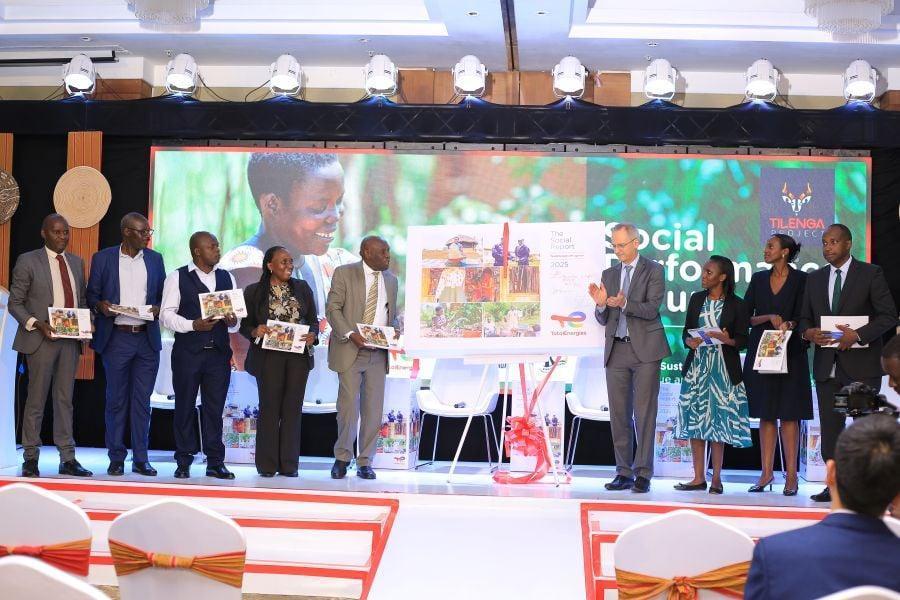Africa-Press – Uganda. The latest social performance report by TotalEnergies Exploration and Production Uganda has so far employed 10,571 Ugandans in Tilenga, Uganda’s flagship oil project.
The report launched by the State Minister for Energy, Sidronius Okaasai Opolot at Kampala Sheraton Hotel indicated that since 2021,99.3% of the project workforce employed by the French company and its contractors are Ugandans.
“Of these, a peak of 3,719(35%) are Ugandans from host communities in the districts of Buliisa, Nwoya, Pakwach, Hoima, Masindi and Kikuube. Notably, 16% of Ugandan employees are female,” the report says.
The report says that 13 Ugandans have undertaken international exposure to work in other TotalEnergies affiliates globally in USA, Africa, Europe and Asia.
TotalEnergies also shows that there is a significant growth in the number of Ugandan companies engaged on the project, with over 240 local suppliers engaged by the French company.
“Ugandan companies are providing both non-specialised goods and services, for instance camp management, manpower provision, medical needs, training and consultancy. Others are providing specialized goods and services such as engineering design, technical studies and construction.”
Locally obtainable goods
The report also indicates that since 2021, goods and services worth $31.3 million(approximately shs118.94 billion) have been procured from host communities suppliers.
TotalEnergies mentions goods and services like fresh foods, accommodation, construction materials, catering services, conference facilities, small tools, labour services and more as those provided by host communities.
Skills and technology to Ugandans
The report also shows that since 2021 $10.8 million(approximately shs39.58 billion) has been invested in various technology transfer and building initiatives with over 1,600 Ugandans having undergone training and certification in various vocational skills including heavy goods vehicle driving, scaffolding and working at heights, coded welding, quality control inspection and non destructive testing and Health, Safety and Environment training.
Communities
The report also shows that 100%(5,576) persons affected by the project have been compensated , with 235 resettlement housing units completed and handed over to owners with titles while 4,513 households have received agriculture and livestock support.
A total of 978 households have benefitted from vocational training and job-seeker support while over 1,000 pieces of post-harvest handling and value addition equipment have been distributed.
The report adds that 5,125 farmer households have been trained in good agronomic practices and provide with quality inputs while 34 community level demonstration farms have been established.
“As government, our position has always been clear and unwavering that the discovery of oil and gas is an opportunity for national transformation. This report by TotalEnergies is a powerful testament to government’s commitment and to the productive partnership we have forged with our private sector partners,” State Minister for Energy, Opolot Okaasai said.
He hailed the employment of Ugandans in the oil and gas sector and local content component.
“Our government’s policy is crystal clear that Ugandans must be the primary beneficiaries of the oil and gas resource. The Tilenga project has been pioneer in this regard, prioritizing local employment and capacity building.”
According to the minister, the skills gained by welders, electricians, engineers and administrators from the local communities are not just for this project but a legacy that will serve the country for generations.
The TotalEnergies Managing Director, Philippe Groueix said the Tilenga Project aims to create a lasting impact among Ugandans.
“This project is not only about developing oil. Of course, oil will flow but it is also about making sure it is bringing a positive impact in the day-to-day life of as many people as possible. This project is not just about oil; it’s about transforming lives and creating lasting value. It is a shared responsibility,” Groueix said.
“At the heart of our efforts to deliver positive impact are key pillars: access to education, clean water, clean energy, and economic empowerment through training. We want to assure everyone that all progress on the Tilenga Project is focused on delivering tangible benefits to Uganda and its host communities.”
For More News And Analysis About Uganda Follow Africa-Press






